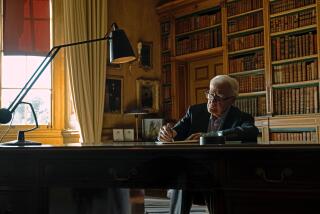Vivian Green, 89; Rector and Religious Historian at Oxford Inspired Le Carre’s Spymaster
- Share via
Vivian Green, a religious historian at Oxford University who was an inspiration for John le Carre’s fictional spymaster George Smiley, has died. He was 89.
Green died Jan. 18 at Shipton under Wychwood, England, according to a death notice published in the Daily Telegraph newspaper.
No cause of death was given.
Ordained in the Church of England, Green was a scholarly yet approachable figure who wrote widely.
He spent most of his academic career at Lincoln College, Oxford, and served as rector from 1983 to 1987.
Writing in the college newsletter in 1995, Le Carre identified Green as one of the inspirations for Smiley, the protagonist in his trilogy, “Tinker, Tailor, Soldier, Spy,” “The Honorable Schoolboy” and “Smiley’s People,” as well as two earlier novels.
Le Carre, who was a student at Sherborne College when Green was the school’s chaplain, said he had borrowed Green’s “strength of intellect and spirit” for Smiley as well as Smiley’s use of thick glasses.
In a 1999 interview with British Broadcasting Corp. radio, Oxford-educated Le Carre described Green as “a much-loved don [teacher] who became effectively my confessor and godfather, who was first of all chaplain at my public school and then turned up amazingly as chaplain at my university.”
That same year, Le Carre said Smiley was actually a composite of two people, the other one being John Bingham, with whom the novelist worked in British intelligence.
Green joked that Smiley’s tendency to disappear into crowds “like a shrimp into sand” was true to life. “I am not a social person; I hate crowds and I don’t enjoy drawing attention to myself,” he once said.
In 1996, Green published “A New History of Christianity,” a survey of 2,000 years of the Christian religion.
He predicted that in the 21st century, beliefs in such concepts as heaven and hell would no longer be relevant to many people and churches would become more insular or more secular as a result.
But he also wrote that many Christians down the years had set a good example and that people would continue to look to the church for answers to the major questions of life.
Born on the Isle of Wight off the southern coast of England, Green was educated at Bradfield, a private school, and Trinity Hall, Cambridge, where he studied history. He was ordained in 1940.
For the next decade he taught at various schools, producing his first book, “Bishop Reginald Peacock,” about a 15th century bishop of Chichester, in 1945.
Later books included “Renaissance and Reformation” (1952), “The Later Plantagenets” (1955), “The Young Mr. Wesley” (1961), “Martin Luther and the Reformation” (1964), “A History of Oxford University” (1974) and “The Madness of Kings” (1993).
More to Read
Sign up for our Book Club newsletter
Get the latest news, events and more from the Los Angeles Times Book Club, and help us get L.A. reading and talking.
You may occasionally receive promotional content from the Los Angeles Times.








